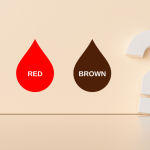
What Is Menorrhagia, and What Is the Connection with Fibroids?
Uterine fibroids are one of the leading causes of menorrhagia, or heavy menstrual bleeding. Fibroids have been found in 10% of all women with menorrhagia and 40% of women with severe menorrhagia.
In this blog, we will explore:
- What is Menorrhagia?
- How Much Blood is Considered Menorrhagia?
- Is Menorrhagia Dangerous?
- What Causes Menorrhagia?
- Menorrhagia Symptoms
- How Do Fibroids Cause Menorrhagia?
- Does Menorrhagia Every Go Away?
- What Happens If Menorrhagia Goes Untreated?
- Diagnosing the Cause of Menorrhagia
- Treatment for Menorrhagia and Fibroids
Menorrhagia is one of the most common health problems reported by women in the US. Every year, around 10 million women (1 in 5 women in the US) experience menorrhagia. Menorrhagia and fibroids most often impact women in their twenties and thirties but can occur any time from puberty until menopause.
While fibroids are commonly associated with heavy periods, menorrhagia may indicate several medical conditions. If you suspect you have menorrhagia caused by uterine fibroids, schedule a consultation with a fibroid specialist.
What Is Menorrhagia?
The CDC defines menorrhagia as heavy menstrual bleeding and/or bleeding that lasts more than 7 days. (Typical menstrual periods should last 3–6 days.) “Heavy bleeding” indicates a flow that requires changing a pad or tampon once every two hours or passing clots larger than a quarter.
Menorrhagia has a significant impact on a woman’s quality of life. Heavy and/or prolonged periods can cause blood loss and potential anemia, lost productivity, increased stress, and diminished mental health.
How Much Blood Is Considered Menorrhagia?
In a normal menstrual cycle, a woman loses an average of 2–3 tablespoons (30–40 ml) of blood. Menorrhagia entails the loss of more than 80 ml in each cycle—about three ounces, or the size of a travel shampoo.
Is Menorrhagia Dangerous?
Menorrhagia indicates an underlying health problem. An early diagnosis can help your doctor address the root issue before it becomes more serious.
As long as the cause of menorrhagia goes unaddressed, excessive blood loss during periods can lead to iron deficiency anemia. Anemia can result in weakness, fatigue, insomnia, dizziness, and pica (a craving for unusual, non-edible items). Severe iron deficiency anemia can also affect heart and lung function and cause breathlessness and palpitations.
What Causes Menorrhagia?
Several conditions can lead to menorrhagia. If you experience heavy or prolonged periods, see your doctor for a professional diagnosis.
Issues that can cause menorrhagia include:
Hormonal Imbalances
Estrogen and progesterone help regulate menstrual cycles and determine the flow during periods. The uterine lining develops during every menstrual cycle and is shed during periods. Abnormal hormone levels can thicken the lining, resulting in heavier bleeding as it sheds.
Hormone levels can be affected by conditions such as thyroid disorder and PCOS. Anovulation, a condition in which the eggs are not released from the ovary, can also trigger hormonal changes that can cause menorrhagia.
Abnormalities in the Uterine Tissue
Non-cancerous growths in the uterus, such as fibroids, polyps (small, grape-sized growths on the inner lining of the uterus), and ADENOMYOSIS (a condition where the inner lining of the uterus grows into the uterine muscular wall) can result in heavy bleeding. Rarely, cancers of the uterus, cervix, or ovaries can also cause menorrhagia.
Intrauterine Devices
Intrauterine birth control can make your periods heavier.
Blood Disorders
Although rare, menorrhagia can be caused by conditions like Von Willebrand disease and platelet disorders. These conditions are usually inherited.
Medications
Blood thinners, hormone replacement therapy, and certain birth control pills can cause heavy period bleeding.
Menorrhagia Symptoms
One in 20 women aged 30–49 years consults her general practitioner each year about heavy blood loss from menstruation. Symptoms of menorrhagia vary by person but usually include a heavier flow and/or bleeding longer than a week.
Many women wonder how to know if they have heavy bleeding. The following symptoms are typical of menorrhagia:
- Changing pads or tampons every 1–3 hours during the heavy flow days (first 2–3 days for most women)
- Doubling up on pads or using a pad and tampon together
- Getting up at night to change pads or tampons
- Passing blood clots larger than 1 inch
- Limiting daily activities due to heavy bleeding, bleeding through clothing, or frequent trips to the bathroom to change pads/tampons
If you soak through two or more pads or tampons in an hour for two hours in a row, inform your healthcare provider or go to the emergency room. This level of excessive bleeding is abnormal and can be life-threatening.
How Do Fibroids Cause Menorrhagia?
The exact reason fibroids cause menorrhagia is unknown, but several theories may explain the connection.
- Fibroids trigger the development of new blood vessels in the uterus, which might cause heavy, irregular periods and bleeding between periods.
- Fibroid tissue may press upon the uterine lining, resulting in heavy bleeding.
- Uterine contractions play an important role in controlling bleeding during periods. The presence of fibroids may hinder uterine contractions, causing heavy and prolonged bleeding. Fibroids may also cause hormonal changes that interfere with uterine contractions.
- Fibroids are associated with high levels of hormones called prostaglandins that can cause heavy bleeding.
- Submucosal fibroids (fibroids on the inner lining of the uterus) increase the surface area of the endometrium (the uterine lining), which may cause heavy bleeding.
Schedule a consultation with a fibroid doctor to see if this may be tied to uterine fibroids. A fibroid doctor can help diagnose and come up with a proper treatment plan to help you get relief from symptoms.
Does Menorrhagia Ever Go Away?
Menorrhagia does not usually go away by itself. Heavy, prolonged periods are a sign that your body is under some kind of stress, possibly due to an underlying problem like fibroids, hormonal imbalance, or the effect of medications. Since menorrhagia is a symptom of an underlying condition, it can only be resolved by addressing the cause.
Possible treatments for conditions that cause heavy bleeding include:
- Hormone therapy to correct hormonal imbalances. This may involve birth control pills, prostaglandin inhibitor drugs, or progesterone supplements.
- Surgical treatments, such as dilatation and curettage, endometrial ablation, myomectomy, or hysterectomy.
- Non-surgical procedures like uterine fibroid embolization.
What Happens If Menorrhagia Goes Untreated?
Women who experience menorrhagia may have difficulty leading a normal life during their periods, for instance, avoiding social activities due to the fear of accidents. Menorrhagia may be accompanied by severe menstrual cramps, which can limit your activities at home and even make you bedbound during heavy flow days.
Heavy bleeding can deplete the body’s supply of iron, causing extreme fatigue and impacting the immune system, kidneys, heart, and lungs. Low iron levels can also cause pregnancy complications.
Menorrhagia is treatable. A consultation with your healthcare provider can help you discover and treat the cause of menorrhagia.
Diagnosing the Cause of Menorrhagia
During the first consultation, your healthcare provider will evaluate your medical history and perform a physical and pelvic exam. Based on the findings, they may recommend one or more of the following tests to confirm a diagnosis:
- Blood tests. Blood work can reveal a bleeding disorder, abnormal hormone levels, and anemia.
- Pap smear. A typical test to check for cervical cancer.
- Pelvic ultrasound. Advanced imaging can reveal the presence of fibroids and polyps.
- Endometrial biopsy. A small sample of the endometrial lining is taken and tested for abnormalities.
Treatment for Menorrhagia and Fibroids
If your menorrhagia is caused by fibroids, uterine fibroid embolization (UFE) may offer relief from heavy, prolonged periods. In one study, UFE treatment resolved menorrhagia in 86 percent of patients at 3 months and 92 percent at 12 months.
Uterine fibroid embolization is a minimally invasive, non-surgical treatment for fibroids. A fibroid specialist, also known as an interventional radiologist, uses ultrasound to guide a tiny catheter into the artery supplying blood to the fibroid. Embolic agents are injected into the artery, blocking blood flow to the fibroid. Without oxygen and nutrients, the fibroid shrinks and eventually dies, leading to the reduction and elimination of symptoms like menorrhagia. In the months after UFE, women experience shorter, lighter, and more manageable periods.
Request a Consultation at USA Fibroid Centers
USA Fibroid Centers is dedicated to providing compassionate, state-of-the-art outpatient treatment for fibroids using UFE. If you’d like to learn more about menorrhagia or how UFE can help you live free of fibroid symptoms, schedule a consultation online or give us a call at 855.615.2555.



